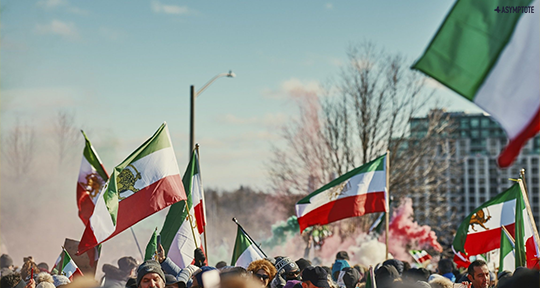Since 2022, the Woman, Life, Freedom movement has made historic advances in fighting for the rights of Iranian girls and women. With protests that have ripped all across the world, the demonstrations have continued Iran’s long tradition of fusing literature with politics, showing that where people and ideas go, poetry soon follows. Here, Cy Strom, co-editor of the forthcoming anthology, Woman, Life, Freedom: Poems for the Iranian Revolution (open for submissions!), discusses the texts, songs, and slogans that make up the fabric of contemporary revolution.
The Iranian revolution that began in September 2022 responded to no political manifesto. Instead, it flared up to an unforgettable line of people’s poetry: “Zan, Zandeghi, Azadi!” This is how “Woman, Life, Freedom” sounds in Persian.
In Kurdish, the language in which this slogan was first spoken, its words are “Jin, Jiyan, Azadî.” That is what Mahsa Jina Amini—the Iranian-Kurdish woman whose brutal death catalyzed the protests—would have heard. Protestors in Iran continue to pay respect to the slogan’s origins when they chant both the Kurdish and Persian words, even when Kurdish is not their mother tongue. In both languages, the words of this slogan are balanced and graceful, the rhythms assertive. It is people’s poetry.
The slogan was first circulated among the women militia fighters in Rojava, the western Kurdish lands by the Syrian-Turkish border, and spread through the writings of Abdullah Öcalan, the imprisoned leader of the Kurdistan Workers’ Party (PKK). Activists and protestors in the streets have now taken these three words as the name for this first ever feminist revolution, and a statement of the best in hopes and ideals for all people everywhere.
Within days of its outbreak, Iran’s “Woman, Life, Freedom” revolution also found its anthem. Amidst Persian-language reworkings of the World War II partisan song “Bella Ciao” (which kept its wildly incongruous Italian refrain) and the 1970s Chilean insurgent march “El Pueblo Unido Jamás Será Vencido,” a string of found poetry began to sound out in Iran, artfully arranged and set to music by singer-songwriter Shervin Hajipour. The people in the streets quickly taught themselves to sing this winding melody, which begins as a murmur but gathers force until a last intake of breath pushes out the words: “Azadi! Azadi!” Freedom. Hajipour assembled the lyrics to this song, which he called “Baraye” (“For” or “For the Sake Of”), from people’s tweets. Some of these were political slogans, some were complaints, some were sweet dreams: “For a dance in the alley. . . For the dreams of the dumpster kids. . . For the jailed beautiful minds. . . For the tranquilizers and insomnia.” The song is said to have gained forty million views in forty-eight hours, and it earned Hajipour six days in prison with the threat of more to come. In February 2023, “Baraye” also earned the first ever Grammy awarded for the best song for social change. READ MORE…






